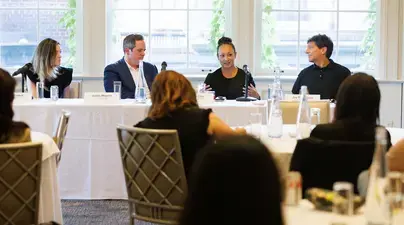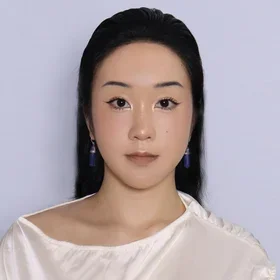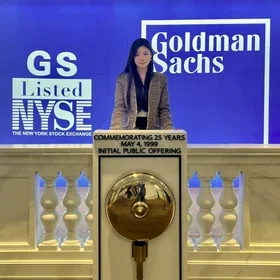By Jaideep Salil
Game changer. Enhancer. Therapeutic. These were some of the words former students of the Executive M.S. in Strategic Communication used to describe their experience in a recent alumni panel event. Participants addressed a range of topics, from how the program prepared them for their current roles to the advice they’d give themselves if they could replay their journey at Columbia.
Devo Probol, an SPS Strategic Communication alumna—and currently a Presidential Ph.D. Fellow at the University of Pennsylvania—moderated the event and also shared some of her own experiences. The panel:
- Gloria Chin, Deputy Communications Director, Office of Mayor Eric Adams
- Justin Meyers, Chief of Operations, New York City Public Safety
- Joe Pantigoso, Vice President, Brand Strategy, Brand and Awareness Marketing, SAP

Edited excerpts:
How the Columbia M.S. in Strategic Communication prepared them for their current roles
Gloria: It might sound like a cliché, but the biggest lesson I learned was how to think more strategically. Before the program, I would focus on small parts of an issue. Move from one small thing to the other. This program forced me to consider the bigger picture. Why are you doing something? Does it contribute to the overall higher-level message the organization is trying to make? The ability to prioritize thinking at the high level [is what] I learned through the Strategic Communication program.
Justin: This program equipped me with the fundamentals. It helped me realize and articulate more precisely what it is that I want to do, and that good communication skills are vital in any profession. If you can meaningfully connect with other people and boil down a complicated issue to a simple and understandable concept, then you are in possession of a really powerful skill.
Joe: Primarily, it was an opportunity to practice and master the tricks of the trade. I still play back what I learned in the program.
Devo: It was an opportunity to improve my interpersonal skills and grow professionally. To be working with so many different people from all across the world, you just absorbed information by being in close proximity to such a diverse group.
Ways the program got them to where they are now
Gloria: I was working with the New York City Department of Transportation, which was my second job with the city government before I started at Columbia. I saw great examples of leadership in this role and wanted to get there myself. The program allowed me to get there. It was a game changer. I started to believe that it was not enough just for me to be a match for a particular job, but the job should be a match for me too. This program gave me the biggest confidence boost.
Joe: I think I became bolder. You have to ask if you want something. Don’t be shy. Be audacious.
Justin: It all comes down to what you choose to do with this degree. Some people expect it to be an easy ticket to a better job. That’s not how it works. Columbia is certainly an incredibly useful guarantor of your credentials; however, it ultimately comes down to how you can leverage that brand to open more doors for yourself.
Devo: The program helped me realize the why/what of my career path. I was good at problem-solving, and the flexible nature of the program allowed me to explore this skill set across different subject areas. I found this quite helpful in narrowing down my interests.
An example of something they learned that they leverage to this day
Gloria: I learned the power of storytelling. For one of our classes, we were asked to present in the PechaKucha format, which requires presenters to talk over twenty slides, spending no more than twenty seconds on each slide. The slides also change automatically, requiring the speaker to synchronize their speech to the images. No notes. That exercise taught me to speak publicly. It was remarkable to see the progression of confidence in our cohort through the course of the degree.
Justin: The art of the ask. To prepare ourselves for the big asks, we need to practice obtaining “yes” for our small asks. A persuasive communicator is essentially someone who has racked up a lot of successful little asks and in the process built a “yes ladder.” I come back to this often.
Joe: To leverage the support system around me. At the end of the work week, it was great to share frustrations with your colleagues and to hear that they were going through the same thing. It was therapeutic. These interactions were a great stress reliever, and they also enabled us to better learn from one another.
Advice they’d give themselves now when, among other things, it comes to the capstone project
Gloria: Early on in our capstone project with client Barnes and Noble, I doubted the value I was bringing to the table. I felt like I was not contributing enough. Marsha, my team member, talked me out of my insecurity with a line that I will never forget: Never doubt your own sparkle!
Justin: I would remind myself to take advantage of this campus, of this city, of this school. For a lot of people, it’s the last time they’re going to be a student, so really make use of the unique opportunities this program provides. Don’t forget the capstone can be a great addition to your résumé if done right!


